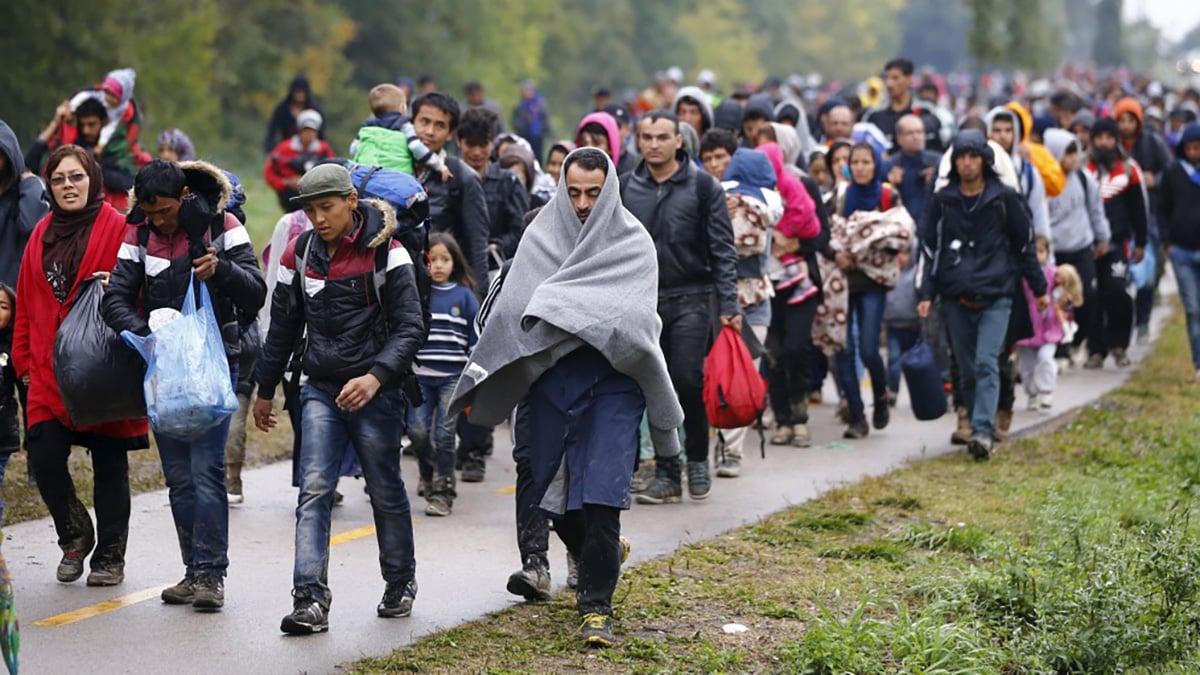Commentary
Lessons from the Bible’s Exodus
The biblical Exodus saw not only Jews but a “wild bunch” flee Egypt for a better life. The same ethics of exodus could be an antidote to the disasters of racism today.

The massive displacement of millions of people, big and small, young and old, women and men, is commonly defined by all as “biblical exodus.” But the Exodus is also, and above all, a definite event that happened, or rather, is told in the most famous book in the history of humanity: the Bible.
What is the relationship between the events we now call an exodus and the famous Exodus? A common feature is the quantity of a moving mass, but another trait they share is that the mass is a composite entity that transcends age or sex. But the most significant feature that links the biblical Exodus of the past with the biblical exodus today is not stressed by the mainstream: namely, the fact that at that time, according to biblical scholars, the Jewish people chose exodus to escape oppressive conditions, slavery and persecution, including through an order, given to Egyptian midwives, to kill Jewish males after birth and to leave alive only females.
Migrants today choose exodus to escape slavery and oppression. No sensible person would dispute that forced hunger is a terrifying form of slavery and that wars are a form of cruel oppression from which everyone has the right to escape.
Yet even at this level, here is a salient difference. There are many politicians, supported by crowds of voters, who do not recognize hunger as a form of slavery and create discrimination against those who choose to escape probable death, classifying them in two categories of fugitives: those legitimate, defined as political refugees, and the illegitimate ones, defined as economic migrants.
When referring to the biblical Exodus, its legitimacy is not subject to substantive argument. Those immigrants we continue to categorize as Jews who moved after a prophet who appeared to them declaring himself sent by the God of monotheism, the God of the slave and the stranger. Were they an ethnically homogeneous people? It seems they were not.
According to the great American writer Rabbi Chaim Potok, in his book Wanderings, they were a “wild bunch.” There were the Israelite descendants of Jacob and various Asian groups: Mesopotamian Akkadians, Hittites, Egyptians and many Habiru — perhaps a Proto-Sinaitic term indicating outlaws of different origins — subversives, smugglers, pimps and thieves.
As for those defined as Jews, did they all follow Moses out of Egypt? Also in this case, the answer is no. Most of them preferred to negotiate the certainty of an acceptable slavery, rather than risking the adventure of a difficult freedom. The jumble of misfits who recognized the dizzying word of the stuttering prophet, became the chosen people, elected because they were a people of slaves and foreigners who recognized in that condition the value of choice. A chosen people, elected from below. A people who came together during the Exodus itself around a floating homeland, a law that advocates an original declination and an unpublished justice and ethics and heads for a “promised” land, the land of the Lord, where they would set up a way of life as foreigners and resident aliens among foreigners, after being freed from the disastrous legacy of the land of Egypt, the nation of idolatry and slavery.
What did the chosen people ask for? They asked to serve the God of freedom and anti-idolatry. This famous story creates one of the storylines of the West and its much-venerated Judeo-Christian identity, an identity full of faults. The arrival in the land inhabited by other people would eventually determine, millennia later, nationalist leanings. The exodus was intended to be the vanguard of humanity that chose to be based on an economy of justice, a society of equal and free men founded on the ethos of guardian of the Earth, and not of his Master.
Didn’t today’s migrants, for their part, flee from idolatry and slavery in their most specific forms: that is, violence against the innocent? And what are they looking for? What are they asking for? For a “promised land” where they can be received by foreigners. They hope to be recognized in their universal dignity.
They wrongly and rightly see the Western countries as their promised land, with a very high rate of contradictory ambiguity, and, the West, seductively, appears as such. It is, however, a largely perverse seduction.
For centuries, the West has been the colonialist Pharaoh, and today, it creates crises while robbing the planet and its resources. Surreptitiously it imposes wars and violence, its logic of a hypertrophic development determines new forms of expropriation, alters the ecological conditions and impacts the climate, devastating vast territories and triggering new and tragic waves of desperate migration.
A part of the old continent, with staggering stupidity and blindness, still reacts by closing the floodgates amid the dirtiest nationalist propaganda soaked in residues of fascist Nazi logic, especially in Central and Eastern Europe, which had also experienced the cancer of that black plague with its baggage of death, destruction, hatred and extermination. Even a self-proclaimed socialist like François Hollande has become an accomplice of this climate, for pure electoral reasons.
Obviously this pandemic has also been fueled by the ideological and imperialistic obsession of the U.S., which has never ceased to fuel anti-communism, even in the absence of communists. The U.S. did not stop to impose the extension of NATO throughout the East, despite the end of the Cold War. It feeds a senseless revanchism that threatens to wreak havoc, but also affects the birth of a united Europe in true democracy.
The ethics of the Exodus applied to large migratory flows could become, in this context, a precious and powerful antidote to counter a potential disaster that announces itself with dark and growing determination.
Originally published at http://ilmanifesto.info/lesodo-biblico-e-il-dolore-dei-migranti/ on 2015-12-31
